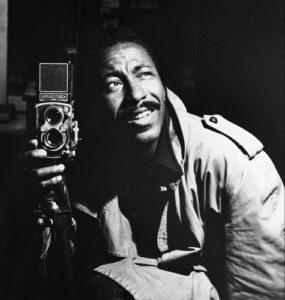The Gordon Parks Foundation
Gordon Parks was one of the seminal figures of twentieth century photography. A humanitarian with a deep commitment to social justice, he left behind a body of work that documents many of the most important aspects of American culture from the early 1940s up until his death in 2006, with a focus on race relations, poverty, civil rights, and urban life. In addition, Parks was also a celebrated composer, author, and filmmaker who interacted with many of the most prominent people of his era – from politicians and artists to celebrities and athletes.
Born into poverty and segregation in Kansas in 1912, Parks was drawn to photography as a young man when he saw images of migrant workers published in a magazine. After buying a camera at a pawnshop, he taught himself how to use it and despite his lack of professional training, he found employment with the Farm Security Administration (FSA), which was then chronicling the nation’s social conditions. Parks quickly developed a style that would make him one of the most celebrated photographers of his age, allowing him to break the color line in professional photography while creating remarkably expressive images that consistently explored the social and economic impact of racism.
